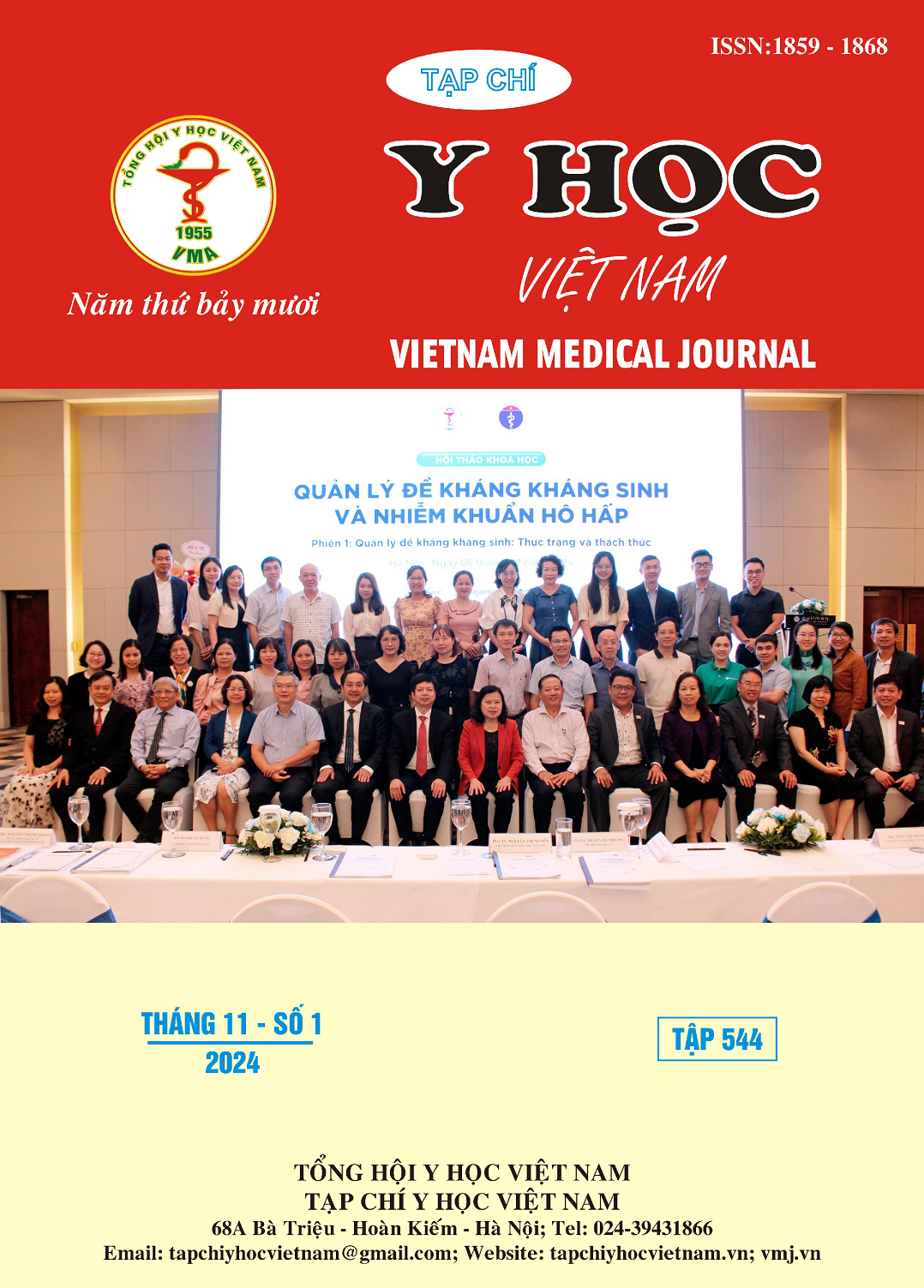DEPRESSION IN PATIENTS FOLLOWING ACUTE CORONARY SYNDROME UNDERWENT PERCUTANEOUS CORONARY INTERVENTIONS
Main Article Content
Abstract
Background: Acute coronary syndrome (ACS) is a medical emergency that not only threatens the life of the patient but also brings a lot of morbidity burden for the survivors after the event, including depression1. PHQ-9 is a highly sensitive and specific score that can be up to 88% to screen for depression4. Objective: To investigate the rate of depression and related factors in patients with acute coronary syndrome by using the PHQ-9 scale. Subjects & Methods: A prospective cross-sectional description of all ACS patients who were followed up at the Interventional Cardiology Department at Cho Ray Hospital from February 2019 to June 2019 using the PHQ-9 scale to assess the status of depression and related factors in the patients surviving. Results: 291 patients ACS have the mean age is 64.2 ±10.7; Males (72.5%). There are 66.3% patients ≥ 60 years old; 7.2% of patients < 50 years old; Hypertension (70.8%) and dyslipidemia (65.3%).The rate of depression in patients after ACS was 21% as measured by the PHQ-9 scale, with no significant difference between clinical types of ACS. Risk factors such as female gender, advanced age, type 2 diabetes, history of stroke, unhappy marital status & family, and joblessness increase the risk of depression in patients after ACS. There was no association between depression with Killip classification and beta-blocker use in acute coronary syndromes. Conclusion: Depression after ACS is not uncommon, can reach up to 21%. It also carries a heavy burden of disease for ACS survivors. This is a clinical entity that has not received much attention from cardiologists.
Article Details
Keywords
: acute coronary syndrome (ACS), depression, PHQ
References
1. Frost JL, Rich RL, Jr., Robbins CW, et al. Depression Following Acute Coronary Syndrome Events: Screening and Treatment Guidelines from the AAFP. Am Fam Physician. Jun 15 2019; 99(12):Online.
2. Osler M, Martensson S, Wium-Andersen IK, et al. Depression After First Hospital Admission for Acute Coronary Syndrome: A Study of Time of Onset and Impact on Survival. Am J Epidemiol. Feb 1 2016;183(3):218-26.
3. Thombs BD, Bass EB, Ford DE, et al. Prevalence of depression in survivors of acute myocardial infarction. J Gen Intern Med. Jan 2006;21(1):30-8.
4. Barth J, Schumacher M, Herrmann-Lingen C. Depression as a risk factor for mortality in patients with coronary heart disease: a meta-analysis. Psychosom Med. Nov-Dec 2004; 66(6):802-13.
5. Parashar S, Rumsfeld JS, Spertus JA, et al. Time course of depression and outcome of myocardial infarction. Arch Intern Med. Oct 9 2006;166(18):2035-43.
6. Trang PTSvTK. Trầm cảm sau nhồi máu cơ tim theo thang điểm Beck. Y học TP Hồ Chí Minh. 2012;16(1):369 - 375.
7. Lê Công Thiện NKVvNTBY. Bước đầu nghiên cứu đặc điểm lâm sàng trầm cảm ở bệnh nhân sau nhồi máu cơ tim điều trị nội trú tại Viện tim mạch - bệnh viện Bạch Mai. Y học thực hành. 2012;9:3 - 5.
8. Zhao YJ, Jin Y, Rao WW, et al. Prevalence of Major Depressive Disorder Among Adults in China: A Systematic Review and Meta-Analysis. Front Psychiatry. 2021;12:659470.
9. Mezuk B, Eaton WW, Albrecht S, Golden SH. Depression and type 2 diabetes over the lifespan: a meta-analysis. Diabetes Care. Dec 2008; 31(12):2383-90. doi:10.2337/dc08-0985
10. Naqvi TZ, Rafique AM, Andreas V, Rahban M, Mirocha J, Naqvi SS. Predictors of depressive symptoms post-acute coronary syndrome. Gend Med. Dec 2007;4(4):339-51.
2. Osler M, Martensson S, Wium-Andersen IK, et al. Depression After First Hospital Admission for Acute Coronary Syndrome: A Study of Time of Onset and Impact on Survival. Am J Epidemiol. Feb 1 2016;183(3):218-26.
3. Thombs BD, Bass EB, Ford DE, et al. Prevalence of depression in survivors of acute myocardial infarction. J Gen Intern Med. Jan 2006;21(1):30-8.
4. Barth J, Schumacher M, Herrmann-Lingen C. Depression as a risk factor for mortality in patients with coronary heart disease: a meta-analysis. Psychosom Med. Nov-Dec 2004; 66(6):802-13.
5. Parashar S, Rumsfeld JS, Spertus JA, et al. Time course of depression and outcome of myocardial infarction. Arch Intern Med. Oct 9 2006;166(18):2035-43.
6. Trang PTSvTK. Trầm cảm sau nhồi máu cơ tim theo thang điểm Beck. Y học TP Hồ Chí Minh. 2012;16(1):369 - 375.
7. Lê Công Thiện NKVvNTBY. Bước đầu nghiên cứu đặc điểm lâm sàng trầm cảm ở bệnh nhân sau nhồi máu cơ tim điều trị nội trú tại Viện tim mạch - bệnh viện Bạch Mai. Y học thực hành. 2012;9:3 - 5.
8. Zhao YJ, Jin Y, Rao WW, et al. Prevalence of Major Depressive Disorder Among Adults in China: A Systematic Review and Meta-Analysis. Front Psychiatry. 2021;12:659470.
9. Mezuk B, Eaton WW, Albrecht S, Golden SH. Depression and type 2 diabetes over the lifespan: a meta-analysis. Diabetes Care. Dec 2008; 31(12):2383-90. doi:10.2337/dc08-0985
10. Naqvi TZ, Rafique AM, Andreas V, Rahban M, Mirocha J, Naqvi SS. Predictors of depressive symptoms post-acute coronary syndrome. Gend Med. Dec 2007;4(4):339-51.


